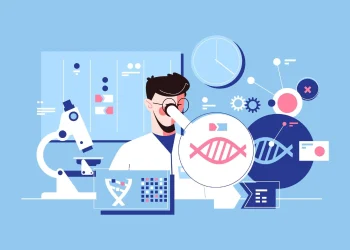Introduction to Gene Editing
Welcome to the fascinating world of gene editing, where science fiction meets reality and sparks a debate that resonates across laboratories, classrooms, and dinner tables alike. Gene editing technology has unlocked unprecedented potential to revolutionize medicine, agriculture, and beyond. However, with great power comes great responsibility – prompting us to ponder: is gene editing a groundbreaking leap toward a brighter future or a Pandora’s box of ethical quandaries waiting to be opened? Let’s delve into this captivating discussion together.
Benefits of Gene Editing
Gene editing is revolutionizing the field of medicine by offering promising benefits that were once unimaginable. One significant advantage is the potential to treat genetic disorders at a molecular level, providing hope for patients with conditions that were previously deemed incurable online blackjack south africa. This technology allows for precise modifications in DNA, correcting faulty genes and potentially preventing hereditary diseases from being passed down to future generations.
Moreover, gene editing has opened doors for personalized medicine, where treatments can be tailored to an individual’s genetic makeup. This targeted approach enhances treatment efficacy while minimizing side effects, leading to more successful outcomes for patients undergoing therapy.
Furthermore, gene editing holds promise in agricultural practices by creating crops that are more resistant to diseases and environmental stressors. By enhancing crop yields and nutritional content through genetic modifications, we can address food security challenges on a global scale.
In conclusion (just kidding!), the benefits of gene editing are vast and diverse, holding immense potential to transform healthcare, agriculture, and various other industries in ways we have yet to fully comprehend.
Controversies Surrounding Gene Editing
Gene editing has sparked numerous controversies in the scientific community and beyond. One of the main concerns revolves around the potential for unintended consequences when modifying genes. Critics argue that altering DNA could lead to unforeseen genetic mutations or disruptions, with unpredictable outcomes for future generations.
Another hotly debated issue is the ethical implications of gene editing, particularly when it comes to human germline modification. The idea of “designer babies” raises questions about playing “nature’s role” and whether we are crossing ethical boundaries by manipulating our genetic makeup.
Furthermore, there are fears surrounding equity and access to gene editing technologies. Will gene editing exacerbate existing inequalities by creating a divide between those who can afford enhancements and those who cannot? This disparity could widen social divides and perpetuate injustices in healthcare.
These controversies highlight the complex nature of gene editing technology and emphasize the importance of thoughtful consideration and robust regulation moving forward.
Ethical Concerns
Gene editing technologies like CRISPR-Cas9 have opened up a world of possibilities in treating genetic diseases and enhancing crops. However, along with these advancements come ethical concerns that cannot be ignored. One major issue is the fear of designer babies, where parents could potentially choose specific traits for their children, leading to questions about natural selection and inequality.
There are also worries about unintended consequences of gene editing, such as off-target mutations or long-term effects that we may not fully understand yet operationgoldstar. The idea of “playing God” by altering the fundamental building blocks of life raises philosophical and moral dilemmas that need careful consideration.
Moreover, there are concerns about the commercialization of gene editing technologies and who will have access to these expensive treatments. Ensuring equitable distribution and avoiding exacerbating existing social inequalities is crucial in navigating this new frontier responsibly. As we continue to push the boundaries of what is scientifically possible, it’s essential to keep ethics at the forefront of decision-making processes.
Current Regulations on Gene Editing
As the field of gene editing continues to advance rapidly, regulations play a crucial role in ensuring the safe and ethical application of this technology. Different countries have varying laws and guidelines governing gene editing research and its implementation.
In some regions, there are strict regulations that require thorough scrutiny before any experiments involving human embryos or germline modifications can proceed. These measures aim to prevent potential risks and ensure that gene editing is used responsibly.
On the other hand, some countries have more lenient regulations that allow for greater flexibility in conducting research but still emphasize the importance of ethical considerations. The debate over how tightly gene editing should be regulated remains ongoing as scientists, policymakers, and ethicists navigate this complex landscape.
Striking a balance between fostering innovation in gene editing while upholding ethical standards is essential for shaping the future direction of this groundbreaking technology.
The Future of Gene Editing: Possibilities and Limitations
As we look towards the future of gene editing, the possibilities seem boundless. Imagine a world where genetic diseases are eradicated before birth, where cancer can be treated at its root cause, and where organ transplants become more accessible through engineered organs. Gene editing holds the promise of revolutionizing healthcare as we know it.
However, with great power comes great responsibility. The limitations of gene editing cannot be overlooked. Ethical dilemmas arise when considering altering human DNA, potential unintended consequences on future generations, and the risk of creating genetic disparities between different socioeconomic groups.
Despite these challenges, researchers continue to push boundaries in gene editing technology, striving to maximize benefits while minimizing risks. Collaborative efforts between scientists, policymakers, and ethicists will be crucial in navigating this uncharted territory responsibly and ethically.
Conclusion: Finding a Balance between Advancement and Ethics
As we look towards the future of gene editing, it is clear that there are immense possibilities to revolutionize healthcare, agriculture, and various other fields. However, with these advancements come ethical dilemmas that must be carefully navigated. Striking a balance between scientific progress and ethical considerations will be crucial in harnessing the full potential of gene editing technology. It is up to researchers, policymakers, and society as a whole to ensure that gene editing is used responsibly and ethically for the betterment of humanity while respecting moral boundaries. By promoting transparency, engaging in open discussions, and implementing robust regulatory frameworks, we can pave the way for a future where gene editing serves as a force for good while upholding ethical standards. Finding this delicate equilibrium will be key in shaping the future trajectory of gene editing technology for generations to come.












